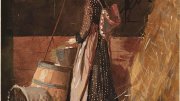Stay True, by Hua Hsu, Ph.D. ’08 (Doubleday, $26). A New Yorker staff writer and Vassar associate professor travels back to his youth as a son of Taiwanese immigrants, coming to terms with his culture, and his college friendship with Ken, a perfectly assimilated Japanese American. Every detail of life in Berkeley then seems engraved in his memory and is recaptured here—because the friendship they shared ended shockingly, when Ken was killed in a carjacking.
Winslow Homer: American Passage, by William R. Cross, M.B.A. ’86 (Farrar, Straus & Giroux, $50). Having segued from investment management to independent scholarship and musuem consulting, Cross has written a stunning, comprehensive interpretation of the artist, whose work brought the Civil War home to so many Americans, and subsequently rendered vivid much else about his changing country. A wonderfully written, triumphant book about this Homer’s bearing “witness to the conflicts within which American identity would be forged.”
Objects of Love and Regret: A Brooklyn Story, by Richard Rabinowitz ’66, Ph.D. ’77 (Harvard, $29.95). Rabinowitz is a public historian who has helped establish and curate programs and exhibitions, from Old Sturbridge Village and the Lower East Side Tenement Museum to state and local historical sites nationwide. Here he curates a family memoir through everyday objects: a bottle opener, a pair of bandage scissors, a Magnavox TV-stereo. He can write: “For the Schwartz family, as for most immigrants, arriving in New York both tightened and loosened the family bonds.”
Riding Jane Crow: African American Women on the American Railroad, by Miriam Thaggert ’93 (University of Illinois, $22.95 paper). “So many of Black women’s encounters on the railroad have been fraught with anxiety,” writes the author, of SUNY Buffalo. “One claim I make…is that women of color…have been denied the ‘feeling of forgetfulness’ so routinely celebrated in men’s…travel narratives.” Her wonderfully illustrated book shows why, as does her “Handmaidens for Travelers,” an exhibition on Pullman Company maids at the Newberry Library, through September 16.
Where Futures Converge: Kendall Square and the Making of a Global Innovation Hub, by Robert Buderi (MIT, $34.95), and Born in Cambridge: 400 Years of Ideas and Innovators, by Karen Weintraub and Michael Kuchta (MIT, $39.95). A narrative and an illustrated history, respectively, of a creative crossroads—from candy making, Polaroid cameras, and Julia Child, to today’s biotech, digital, and emerging enterprises. Given MIT’s entrepreneurial DNA, and Harvard’s increasing emphasis on its applied-sciences and entrepreneurship district (admittedly, across the Charles, in Allston), it’s useful to have these complementary back stories. All three authors have Cambridge ties, and Kuchta’s work as an urban planner for Harvard provides useful grounding.
The Nation That Never Was: Reconstructing America’s Story, by Kermit Roosevelt III ’93 (University of Chicago, $25). A law professor (at Penn) argues that the nation’s founding narrative—the Declaration of Independence, Revolution, and Constitution—is at odds with its commitment to inclusive equality: “The standard story ties us to a problematic past, but we can escape that trap.” Doing so means finding the country’s real story in post-Gettysburg Address, Reconstruction America: repudiating the Founders’ flawed handiwork to pursue “the belief that we fight not only for ourselves, that we should lift up even those we did not push down….”
The Secret Syllabus: A Guide to the Unwritten Rules of College Success, by Jay Phelan, Ph.D. ’95, and Terry Burnham, Ph.D. ’97 (Princeton, $18.95 paper). A UCLA biologist and a Chapman University business economist reflect on their own educational errors and their experience counseling thousands of students (including at the College) in a breezy, but eminently practical guide to the huge investment of time and funds that many undergraduates undertake without knowing what’s what. It’s hard to argue with admonitions such as “Not having a career plan on Day 1 usually is better than having one” and “In choosing your courses seek great teachers”—memorable, representative chapter titles.
The Proof: Uses of Evidence in Law, Politics, and Everything Else, by Frederick Schauer, Stanton professor of the First Amendment emeritus (Harvard, $29.95). It is, sadly, a sign of the times that an eminent legal scholar needs to weigh in on the meaning of facts and the uses of evidence, drawing on law, psychology, philosophy, and more. He is approachable: “Disliking anchovies is a preference. Believing that anchovies do not exist is an empirical mistake. And taking a dislike for anchovies as a reason for denying their empirical existence is a fallacy.” It is perhaps too much to hope that Schauer will be widely read, and agreed with.
Black Snow, by James M. Scott (W.W. Norton, $35). A 2007 Nieman Fellow, who now writes books about war, narrates the story of “Curtis Lemay, the Firebombing of Tokyo, and the Road to the Atomic Bomb” (the subtitle) on an epic scale. At a time when Russian artillery and missiles rain down indiscriminately on Ukrainian civilians, it is important, if painful, to be reminded of any war’s human costs—here, inflicted by incendiary-laden American B-29s, leaving literal piles of burned corpses.

The production line for B-29s, instruments for a more horrific form of war
Courtesy of the U.S. Air Force
Two Cheers for Politics, by Jedediah Purdy ’97 (Basic Books, $29). Columbia’s Beinecke professor of law argues that current discontents reflect the thinning out of democracy, not its failure. (His subtitle is “Why democracy is flawed, frightening—and our best hope.”) Looking back from 2050, he imagines histories as if America were steered by strongmen, or entrusted to experts, or descended further into dysfunction. His fourth possibility, the “hardest to forecast,” is about how “citizens overcame their impasses and addressed their crises.” Getting there requires Americans to “put democracy first.” Here’s hoping.
Getting to Diversity: What Works and What Doesn’t, by Frank Dobbin, Ford professor of the social sciences, and Alexandra Kalev (Harvard, $29.95). Harvard’s sociology chair and a fellow sociologist at Tel Aviv University probe how changes in corporate systems and practices make a difference in diversifying organizations (as Band-Aid training sessions and sanctions on individual behavior probably do not). Recruitment, mentoring, skills training, and mixing up segregated teams work: not easy, but a whole lot easier than endlessly repeating ineffective measures.
Rebel with a Clause: Tales and Tips from a Roving Grammarian, by Ellen Jovin ’87 (Mariner, $24). Setting up a sidewalk table in Manhattan as a “roving grammarian” may sound (and is!) quirky, but the resulting exchanges and advice yield an entertaining and extremely useful set of guidelines and reassurances about nagging problems such as using contractions in formal writing (it’s okay), overcoming a “spousal apostrophe dispute,” etc. Providing “some therapeutic calm to people who are distraught about grammar” turns out to make for delightful reading, too.
Aging with a Plan, by Sharona Hoffman, J.D. ’88 (First Hill Books/Wimbledon, $30 paper). In this second edition of an eminently practical, but also humane guide, the Hahn professor of law and professor of bioethics at Case Western Reserve helps the middle-aged (and above) plan for what lies ahead to “vastly improve your tomorrow.” The money parts may be a little ill-timed, given a possible recession, but discussions of care communities, geriatric and long-term care, legalities, and hospice and other choices, more than meet the author’s initial aim: “to address my own anxieties about growing old without children.”









